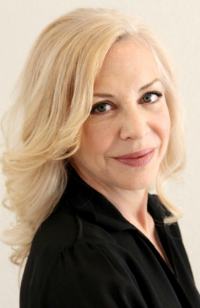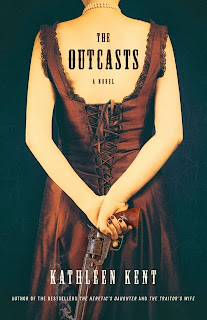I’m so proud and happy to host a Q&A today with Kathleen
Kent. Kathleen’s a fantastic writer and her topics are near and dear to my
heart: witchcraft (The Heretic’s Daughter), Colonial Massachusetts (The
Wolves of Andover, also titled The Traitor’s Wife, but I love the
consonance of the first title), and the lawless Old West (her latest novel, The
Outcasts, which releases on Sept. 24, three days from now. Order now!)
Kathleen gave me an ARC at the Historical Novels Society
conference in June. I devoured it and loved it; it really is a wonderful book and filled with harrowing scenes and lots of good plot twists. Here is our interview:
Q: In your new book The Outcasts you write two
different character’s storylines: Lucinda Carter, who escapes a brothel and
journeys to meet up with an old acquaintance, and Nate Cannon, doing a stint
with the Texas Rangers. Was it difficult to write from a male perspective?
KK: No, I didn’t find it difficult at all. My second novel, The Traitor’s Wife, was written from
various male points of view, as well as female. We all have masculine and
feminine traits and intuitions, and part of the joy of being a writer is trying
on all of those personas. I also think growing up with a dad who was a great
storyteller of Texas legends helped to plant the voices in my head. From him I
adopted the pride, awe and, at times, despair for the wild, rough-edged and
dangerous men and women who settled the early frontier.
Q: What kind of research did you do to understand the
psychology of someone who
knows their lover does despicable, harmful things to
others—and yet still fiercely loves and admires them?
KK: There are so many stories in the history books, ancient
and modern, of otherwise reasonable, intelligent women falling for unscrupulous
men. Certainly it still happens today. All you have to do is open the paper (or
click on the story while on-line) to see the destruction and carnage as a
result of a woman aiding and supporting a bad man on a crime spree. As a
character study, it was interesting to develop Lucinda’s growing dependence on
her lover and the way she rationalizes his character and behavior. In a time
when women had---and in many places still have---so few choices in their own
destinies, it was easier and at times safer to turn a blind eye to misdeeds.
Q: We talked about your striking cover art in person. Can you
talk a little bit about your input, and your feelings about the image? Is that
gun *the* gun?
KK: I’ve been really fortunate in that regard as I’ve had a
lot of say in the publisher’s choosing the cover art for my first two novels.
For The Outcasts we discussed
concepts first and then started looking at images. When I was shown the image
that everyone seemed to love the most, I was equally enthusiastic about it. .
.all except for the gun the woman is holding. Originally, the gun in the photo
was a flintlock pistol from the late 1700s. It was a beautiful weapon, but
completely inappropriate to the era. I sent back some images of Colt revolvers
and, through the magic of photoshopping, the gun was magically transformed. If
there’s one thing Texans know, it’s their guns! The gun that Lucinda carries in
the novel is a small Remington derringer, effective in close quarters, but too
small to look impressive on a book jacket.
Q: I know from your blog you’ve been interested in rumors of
buried treasure in Middle Bayou. Did you have a similar fascination with the
Texas Rangers?
KK: Growing up in Texas I was fascinated by the legends of
the Texas Rangers. One of my father’s distant relatives, Thomas Hickman, is in
the Ranger Hall of Fame and was most noted for keeping law and order in the
wild North Texas oil-boom towns where my dad grew up. The Rangers of 19th c.
Texas seemed to be a law unto themselves and were left unchallenged by
government and welcomed by the settlers of the Republic to pursue their own
unsanctioned and often violent methods of keeping the peace. After the Civil
War, the Rangers were disbanded for a short while, but they continued to
protect and serve unofficially, their experience and loyalty to the brotherhood
often times more effective than the newly formed Texas State Police in keeping
bushwackers, carpetbaggers, cattle and horse thieves at bay.
Q: What are you working on next?
KK: I have two projects that I’ve begun and I’ll have to
decide soon which manuscript to finish before the other. The first is a
historical novel set in 1910 in a Pennsylvania coal town and involves a mining
accident and missing children. The second is a contemporary novel based on a
short story, “Coincidences Can Kill You”, that will be published this November
in Dallas Noir, an anthology of crime
stories by Dallas authors.
Thanks so much, Kathleen! I wish you a world of luck with your launch in a few days. I'm sure we will be seeing this one on the NYT bestseller list as well.
. . . .


